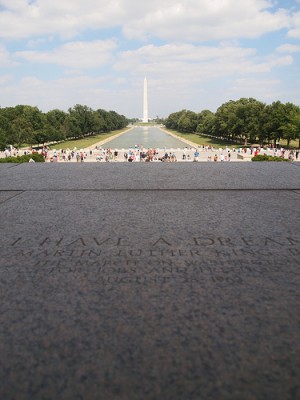Remembering the “Moral Leader of our Nation”
As someone who did Speech and Debate for all four years of high school, I have a special appreciation for first drafts, unexpected riffs and the power to be inspired by the moment, the divine…or Mahalia Jackson. Check out “On Martin Luther King Day, remembering the first draft of ‘I Have a Dream‘”, by Clarence B. Jones, via WaPo:
The weather and the massive crowd were in sync – both calm and warm for the March on Washington. Even the D.C. Metropolitan Police, which had been bracing for a race riot, had nothing to complain about.
I remember when it was all over but the final act. As I stood some 50 feet behind the lectern, march Chairman A. Philip Randolph introduced Martin, to wild applause, as “the moral leader of our nation.” And I still didn’t know how Martin had pulled the speech together after our meeting.
After Martin greeted the people assembled, he began his speech, and I was shocked when these words quickly rolled out:
It is obvious today that America has defaulted on this promissory note, insofar as her citizens of color are concerned. Instead of honoring this sacred obligation, America has given the Negro people a bad check.
Martin was essentially reciting the opening suggestions I’d handed in the night before. This was strange, given the way he usually worked over the material Stanley and I provided. When he finished the promissory note analogy, he paused. And in that breach, something unexpected, historic and largely unheralded happened. Martin’s favorite gospel singer, Mahalia Jackson, who had performed earlier in the day, called to him from nearby: “Tell ‘em about the dream, Martin, tell ‘em about the dream!”
Martin clutched the speaker’s lectern and seemed to reset. I watched him push the text of his prepared remarks to one side. I knew this performance had just been given over to the spirit of the moment. I leaned over and said to the person next to me, “These people out there today don’t know it yet, but they’re about ready to go to church.”
What could possibly motivate a man standing before a crowd of hundreds of thousands, with television cameras beaming his every move and a cluster of microphones tracing his every word, to abandon the prepared text of his speech and begin riffing on a theme that he had used previously without generating much enthusiasm from listeners?
Before our eyes, he transformed himself into the superb, third-generation Baptist preacher that he was, and he spoke those words that in retrospect feel destined to ring out that day:
I have a dream . . .
In front of all those people, cameras, and microphones, Martin winged it. But then, no one I’ve ever met could improvise better.
The speech went on to depart drastically from the draft I’d delivered, and I’ll be the first to tell you that America is the better for it. As I look back on my version, I realize that nearly any confident public speaker could have held the crowd’s attention with it. But a different man could not have delivered “I Have a Dream.”
Some believe, though the facts are otherwise, that Martin was such a superlative writer that he never needed others to draft material for him. I understand that belief; fate made Martin a martyr and a unique American myth – and myths stand alone. But admitting that even this unequaled writer had people helping him hardly takes anything away. People like Stanley, Mahalia and I helped him maximize his brilliance. If not, why would Mahalia interrupt a planned address? She wasn’t unhappy with the material he was reading – she just wanted him to preach.






